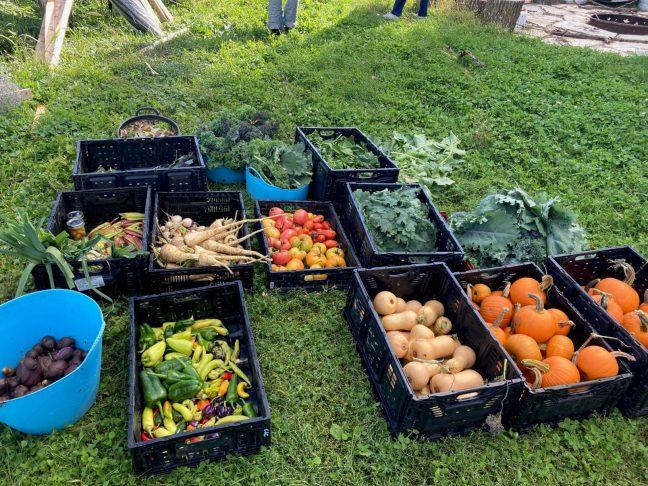Every Sunday at 12:30 p.m. on East Campus Mall, the F.H. King Students for Sustainable Agriculture club hosts weekly harvest handouts, dispensing free produce to University of Wisconsin students and the Madison community.
F.H. King, established in 1979, grows all of their own produce on a one-acre plot in the Eagle Heights community garden, Molly DeVore, the organization’s urban agriculture director, said. DeVore said the land is not only used for vegetable production but also for raspberry and strawberry patches, an herb garden and more, according to the F.H. King website.
“What produce we offer varies on what seeds we have,” DeVore said. “Recently we’ve been producing a lot of potatoes, tomatoes, leafy greens like kale and arugula, carrots and broccoli. We also experimented a bit.”
According to F.H. King, more than 400 lbs of produce per week are distributed to students at the height of the growing season. A freight-bike system is used to transport the produce.
DeVore said freight bikes are human-powered bikes created specifically for carrying large loads and are a more environmentally-friendly option than cars.
“Usually we recruit student volunteers to pick up food waste from local businesses and deliver it to our farm compost using a bike trailer, but because of COVID this year, just me and the other urban agriculture director ran it,” DeVore said.
The club also uses a hydroponic system to grow produce, F.H. King’s Education Director Sophia Webber said.
Hydroponic systems create a means of growing plants in the absence of soil. Many farmers opt for a hydroponic system if they are limited by the harsh weather of the changing seasons, DeVore said, because it allows for the ability to grow crops whenever.
“The hydroponics system is useful for winter growing as it can be done indoors with very little space,” DeVore said.
Despite the COVID-19 pandemic, F.H. King continued its harvest handouts every Sunday.
According to their website, the club saw a steady turnout of over 100 students visiting their handouts to receive produce.
“We worked so hard to make sure the university saw us as an essential service,” Webber said. “COVID has definitely been an obstacle, and we do wear masks the whole time at the farm and require masks at all of the handouts, although it is difficult because we cannot have volunteers.”
In addition to the harvest handouts, F.H. King offers many other resources and hosts events for students. With the pandemic cancelling all in-person club meetings, the club offers virtual programming for interested students.
Next month, Sophia said F.H. King will host a virtual “Ask a Farmer” event where students can tune in and learn about the farm operations.
Not only will the club host live events and monthly meetings, they will also run a variety of programs on their website.
“We’ve been doing some interactive programming, like our pickling programs,” Webber said. “We pre-record how to pickle spicy peppers and other vegetables and post it on our website. We will also soon have some pumpkin videos up, so stay tuned!”
The website also features several movie and book reviews written by board members.
The reviewed movies span a litany of topics and include documentaries such as Eating Animals, which highlights some of the more problematic aspects of meat production. Their reviews also include more mainstream fictional movies reflecting concrete societal issues such as “Okja,” featured on Netflix.
F.H. King offers summer farm internships through which interns have the opportunity to learn about sustainable agriculture and farming, Webber said.
According to the F.H. King website, the internship is a five-hours-a-week commitment for eight weeks of summer. The opportunity involves workshops and discussion covering sustainability and hands-on work such as sowing, planting and harvesting on the farm.
“It is an unpaid internship, but college credit is offered,” Webber said.
Despite the COVID-19 pandemic, F.H. King worked to continue offering both students and the greater Madison community a variety of fresh produce in an eco-friendly manner using their freight-bike system.
Webber said COVID-19 motivated the club to provide a high volume of food for students.
“We want to provide as much sustenance as possible, like starchy food,” Webber said. “Especially with COVID and food insecurities, in the future we want to get sweet potatoes or black beans with protein.”


